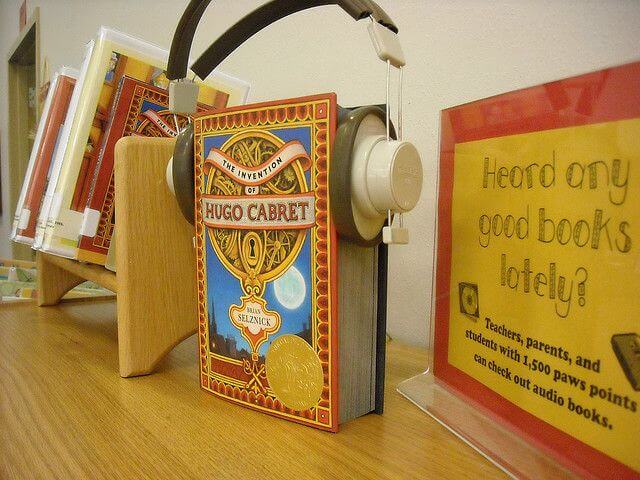Audiobooks are the fastest growing segment in the digital publishing industry. The United States continues to be the biggest market for the audio format and in 2017; there was over $2.5 billion dollars in sales, which is a slight increase from the $2.1 billion generated in 2016. Michelle Cobb of the Audiobook Publishers Association stated, “26% of the US population has listened to an audiobook in the last 12 months.
In their 2017 annual report, the APA reported a 33.9% increase in the number of audiobooks published compared to the year prior; although the final numbers are not in, I believe publishers will have issued over 79,000 new audiobooks, which is a 29% increase from 2016.
The boom in audiobook production has provided a huge rate of return. HarperCollins, Hachette, Simon & Schuster and Penguin Random House have all verified that ebook sales have declined by around 5% and the only way their digital unit has consistently seen profit, is primary due to audiobooks.
There is a big youth movement when it comes to audiobooks and 48% of all listeners are under the age 35. Publishers have the mentality “If we capture them now, when they’re young and have a little bit more time and a few more dollars, they will keep them listening for the rest of their lives.” This demographic has also listened to an average of 15 books in the last year, and most of them have stated that they agreed or strongly agreed that ‘audiobooks help you finish more books.’
“I am very bullish on audio,” Kristen McClean, executive director of business development for market trends company NPD Book. “This is on the top of my list in terms of things I’m watching.”
The Big Audiobook Trends of 2017
- “Far more listeners are saying they use their smartphone most often to listen to audiobooks than before–29 percent in 2017 vs. 22 percent in 2015.
- “A majority of audiobook listening is done at home (57 percent), with the car being the second most frequently-cited location (32 percent). • 68 percent of frequent listeners do housework while listening to audiobooks. Other multitasking activities among frequent listeners include baking (65 percent), exercise (56 percent) and crafting (36 percent).
- “The 2017 survey asked about voice-enabled wireless speakers (such as Amazon Echo or Google Home) for the first time, with 19 percent of all listeners reporting using them to listen to an audiobook in the last year. Among frequent listeners, that rises to 30 percent.”
- Audiobook listeners read or listened to an average of 15 books in the last year, and 77 percent of frequent listeners agreed or strongly agreed that ‘audiobooks help you finish more books.
- “The top three reasons why people enjoy listening to audiobooks are: (1) they can do other things while listening; (2) audiobooks are portable and people can listen wherever they are; and (3) they enjoy being read to.”
- A number of agents in the United States and United Kingdom have raised concerns about how publishers are demanding audio rights when they also buy print. Agents are raising the point that they should be able to sell the audio as a separate right, but many publishers no longer accept this as even a possibility. Ivan Mulcahy represents Robert Webb and his latest title How Not to Be a Boy. Audible offered him a “six-figure” offer for audio rights; all of the big publishers left the room.
- Audiobooks are becoming so popular that publishers are skipping the book entirely and is initiating a straight to audio production. “We’re asking our best-selling authors, and all of our authors, about old stories, short stories that were never published, plotlines that changed,” says Anthony Goff, senior vice president of content development and audio publisher at Hachette Audio. “Things they might find in their desk drawer that they could record in audio.” Christopher Lynch, president and publisher of Simon & Schuster Audio, says that while he expects to see more straight-to-audio, he does not expect book-length offerings. “I’m thinking of things that are one, two, three hours long,” Lynch said. “If it’s in straight-to-audio, it will be an author people recognize. We have seen that in the past. People pay for that.” For instance, three years ago Simon & Schuster published an hour-and-20-minute audio production of Stephen King’s “Drunken Fireworks.”
- Podcasting is huge business. 40% of the US population has listened to a podcast – up from 36% in 2016 and 24% listen to podcasts at least every month – up from 21% in 2016. Almost all of the companies involved on the retail side of audiobook distribution see podcasts as a gateway to audiobooks. This has prompted Audible, Tunein, Overdrive and Scribd to all launch their own in-house podcast unit. The belief is that if you give away a bunch of free content, people will end up purchasing a subscription or buy a few audiobooks on a whim.
- Overdrive launched their own Podcast, the Book Nerds and it has been incorporated into the main Overdrive system, so libraries can now offer a free podcast for all of their patrons.
- Publishers are also looking at the success of podcasts. “We’re wondering if books drawn from podcasts might be the new hot thing,” said Jamie Leifer, associate publisher of PublicAffairs, part of Hachette. She notes the remarkable advance sales for “The Storm Before the Storm: The Beginning of the End of the Roman Republic” by Mike Duncan, host of “The History of Rome” podcast for 10 years, and, since 2013, the podcast, “Revolutions.” “We weren’t sure if Mike’s avid fans would convert to readers,” Leifer said in an email. “But I’m thrilled to say that they have.” Two months before the book’s Oct. 24 release date, PublicAffairs had “racked up the kinds of pre-orders in hardcover, e-book and downloadable audio that Hachette usually sees for anticipated franchise fiction releases, not serious history titles.”
- Macmillan will launch a true crime podcast, “Case Closed,” beginning with a book published by St. Martin’s three years ago, “Crazy For You” by Michael Fleeman. The book covered the 2010 slaying of Atlanta executive Rusty Sneiderman, and the podcast will include new developments in the case.
- The BBC has teamed up with Rosina Sound to produce The Inspection Chamber. It’s an interactive audio drama, that harkens back to the glory days of the Choose Your Own Adventure paperbacks. It was designed for playbook on the Alexa smart speaker, Google, and Apple HomePod.
The State of Retail Audiobooks in 2017
Over the course of 2017, the Audiobook industry began to consolidate and expand into international markets. Many companies have started to see the value in offering indie authors a one-stop solution. This includes finding a narrator that suits their needs and a sound engineer. The intention is to allow indies to have full control over the final product, so they can market it themselves.
Audible is the undisputed market leader in audiobook production and operate the world’s largest audiobook store. They tried out a number of new programs in 2017 and they should continue to experiment in 2017
One of the most successful was a new dedicated subscription service called Audible Romance. It that gives users access to thousands of audiobook titles. Listeners will be able to monitor a romance title’s level of steaminess. The illustrated meter on each book page ranks titles on a one to five scale: Sweet, Simmering, Sizzling, Hot Damn, and O-O-OMG. If you want to skip ahead to the steamiest moments of the audiobook, there is a new feature that does it automatically via machine learning. The new romance subscription package gives listeners access to 41 micro-categories and 131 story and character tropes that will allow listeners to explore deep into the catalog in fun ways and discover the romance titles that most appeal to their interests. Each micro-category has have its own browse page, and listeners can enjoy audio samples from each title included before diving into the full story. Audible Romance costs $6.95 per month as an add-on to an existing Audible membership. The price is $14.95 per month as a standalone service. Audible also launched something that incurred the scorn of many people, Audiobooks for Dogs
Back in August, Audible and Cesar Millan have teamed up for a mind boggling initiative called “audiobooks for dogs.” It provides dog owners and caregivers peace of mind when leaving their dogs at home alone, knowing the dog will have the comfort of a human voice. It is a curated list of audiobooks that Fido may like, I hope they don’t do Audiobooks for Cats next.
Audible is trying to expand into international markets and in 2017; the big gambit was Canada. They promised millions of dollars to get publishers to digitize their titles into English and French. In order to take advantage of the Canadian Market Audible opened up the Audiobook Creation Exchange, which is the first time it expanded outside the US and UK. ACX is an online marketplace where authors can hunt around for narrators and sound engineers to get their audiobook produced. Authors can either pay per billable hour or cut the narrator in for a revenue share scheme, based on the number of sales. New authors will find it difficult to get a revenue system, but authors who have a strong track record of ebook sales will have no problem.
Audible may not be operating in China in any official capacity, but the audiobook company has just developed a new Chinese landing page. The Audible Chinese catalogue comprises over 300 audiobooks and audio dramas in Mandarin. It will continue to grow in 2018. “Audible.com currently offers content in 38 languages, and I am excited to extend our catalogue to include Chinese in such a dedicated way,” said Audible Chief Content Officer Andy Gaies. “For the first time, Chinese-speaking audible.com customers can now explore and enjoy a diverse library of authentic content. Through these incredibly produced titles, Audible can now offer the tens of millions of Chinese speakers outside of China compelling listening experiences.”
Audible also has a program to train narrators via ACX University. Neophytes can learn the craft from experts and professionals. In previous years, ACX has done this program as a one-day, in-person event for roughly 70 narrators. For the past two years it has evolved into a series of six panels broadcast to narrators and producers everywhere in the world via the magic of the internet.
Amazon released the second generation Kindle Oasis 2, which was the first Kindle that had Bluetooth and the Audible bookstore. Users had a fully functional audiobook player and the ability to pair up a pair of wireless headphones or a speaker. If users had an existing Audible account, all past purchases are synced. In December 2017, Amazon pushed out a firmware update for the 1st generation Kindle Oasis and the entry level Kindle Basic with the same Audible bookstore and audiobook player. The big rumor right now is that in 2018 Amazon will update the Paperwhite and Voyage with Audible.
Audiobooks.com is the largest competitor of Audible and they were acquired by RBmedia, which is a new conglomerate spearheaded by Recorded Books. This has allowed Audiobooks.com rapid expansion into Australia and the United Kingdom. Ian Small, the former CEO and now General Manager of Audiobooks.com told Good e-Reader “This year, I’ve noticed a significant increase in listeners under the age of 25. This broadening of the audiobook audience is a trend that has kept up momentum over the past several years, and it is exciting to see the impact it is having on industry growth. One encouraging trend I have noticed is the prioritization of audio content this year, unlike prior years when the audiobook version was either not produced at all, or if it was, its publication date lagged far behind the print. This year, we have seen an uptick in simultaneous release dates, and even some instances where the publishers have experimented with releasing the audiobook in advance of the print edition. This shift is notable evidence of shifting attitudes towards audio within the greater publishing industry.”
He went on to say “We’ve always known that audiobook sales are strongly correlated to the release of film or TV adaptations, but one new trend this year is the release of brand new content to support those cinematic launches. For example, HarperCollins collaborated with Kenneth Branagh to publish a new audiobook version of Murder on the Orient Express (which he narrated) to support the release of the film (which he directed and starred in).”
When it comes to digital bookstores the big four are Amazon, Barnes and Noble, Kobo and Apple. All of these companies had their own audiobook retail system, but Kobo was the odd man out. This all changed towards the end of 2017 when the Toronto based company unveiled a new retail shop that allowed people to pay a monthly subscription fee and get a certain number of credits each month to redeem for a single title. Users also had the ability to forgo the subscription package and just purchase audiobooks whenever they wanted. It launched in Australia, Canada, the US and UK and will expand into other European markets throughout 2018.
René d’Entremont the PR Director of Kobo stated, “While our customers read across all genres, the general fiction category is the most popular among our audiobooks listeners. Though it is early days for us, we are also seeing that nonfiction is doing well in audio.” He went on to say “Audiobooks are great in any situation, but especially when you need to be doing two things at once. We continue to create content and messaging to highlight the benefits of audiobooks, for example, to enjoy your favourite stories while driving, jogging, or doing the laundry. We also sponsored this year’s HotDocs Podcast Festival to promote our audiobooks service.”
Scribd is a company that used to abide by the unlimited subscription model with audiobooks and eBooks, but in recent years, they have scaled back. They still have remnants of the old model; you can still download an unlimited amount of much sheet music, magazines and digital newspapers.
Scribd told Good e-Reader that over the course of 2017 audiobooks was their fastest growing segment. Audiobook primary subscribers grew over 24% and audiobook listens were over 7%. There was over 2,963,397 hours of audiobook playback and the most popular genres were personal growth, mysteries, science fiction and fantasy, and career and money. On average, Scribd has found that more women listen to audiobooks than men do.
Coincidentally, Scribd just started their own podcast, ScribdChat podcast, which provides in-depth conversations with leading authors, writers, offers tools, and insights that listeners can apply to their own lives. Adia Colar of Scribd said, “We hope that our podcast will interest current Scribd subscribers and believe it’ll be a gateway for others who enjoy or are considering listening to audiobooks.”
Scribd went on to say, “Awareness has increased, and it’s not surprising given the popularity surge of podcasts. When you combine that with smartphones and tablets, the ease of discovery, and people who are super busy, you get a perfect storm for audiobooks.”
Findaway powers the vast majority of audiobook stores that do not deal with publishers directly. They do business with B&N, Scribd, Tunein and dozens of others. In order to expand their catalog they have developed a self-publishing solution that puts authors directly in touch with narrators and sound engineers. The intention was to have a highly curated approach to self-publishing. Findaway is now the only true alternative to the Audiobook Creation Exchange by Audible.
One of the benefits of Findaway Voices is the ability to have control over the desired narrator. This can be anything from “a female witch with a British accent” or “a male who speaks French and does impressions.” Findaway will then take your book and have five different narrators send over samples and a financial quote. The samples range in production values from a home setup to a proper studio. Unlike other companies operating in the self-publishing space for audiobooks, Findaway is working directly with the authors. Voices is a concierge service for audiobook production, they take care of everything.
The most compelling reason to publish your audiobook with Findaway is their network of partners. They are the largest audiobook distributor in the world. They deal with Apple iTunes, Audible, Audiobooks.com, Baker & Taylor, Nook Audiobooks, Overdrive, Scribd, Tunein and dozens of others. Once an audiobook is opted into all of these platforms, a dashboard will inform the author of sale and royalties.
I think Findaway Voices will be good for narrators. There is a manual approval process and since they just unveiled this new system, they will be looking for capable people. If you have acting, radio or podcasting experience and have content you can send them so they can check out your voice, this will likely get you approved. They will also give advice to students who are taking voice or acting lessons on how they can improve and get involved in narrating audiobooks, along with recommendations of equipment they will need.
The largest audiobook company in Scandinavia is operating out of Sweden, and they are called Storytel. The company has been running an unlimited service for almost 10 years, but it is only since 2010 with the advent of the iPhone and other smartphones that they started to attract more paid subscribers to their platform. CEO Jonas Teller told me “Our local language catalogue of audiobooks varies from country. In Sweden, we had about 5,200 audiobooks in the end of 2016, now we have about 7,500 Swedish audiobooks. On top of that our English language catalogue has grown with around 10,000 titles.” He also mentioned that Crime, Suspense and fiction are the top three-audiobook genres. In 2018, “Storytel’s focus is to launch in a couple of new markets and to create local language audiobooks in the markets where we are present.”
Niclas Sandin, c.e.o. of BookBeat, Bonnier’s ebook and audiobook subscription service in Sweden, said he predicted growth would be in double digits for at least the next decade. He said: “(In) Sweden… we thought the market was pretty mature a couple of years ago when we saw growth of 30% or 40%, but that growth has just increased. It is (driven by) more and more digital people coming in from reading e-books… There is a bright future for the audiobook market.”
Audiobook Publishing
Penguin Random House and HarperCollins are the two largest publishing currently operating in the audiobook space.
Amanda D’Acierno is the Senior Vice President, Publisher, Penguin Random House Audio. She said “We’ve produced nearly 1,000 audiobooks in 2017, a 20% increase over our 2016 title count, bringing the total Penguin Random House Audio catalog to more than 11,000 titles. 2017 was an incredible year at Penguin Random House Audio, from Carol Burnett’s Grammy Award win for IN SUCH GOOD COMPANY, to the American Library Association’s Odyssey Award of Gavriel Savit’s ANNA AND THE SWALLOW MAN, our record-breaking 166-voice production of George Saunders’ LINCOLN IN THE BARDO, to the great success of Dan Brown’s latest, ORIGIN.”
Amanda also talked about she goes about selecting which will receive the audiobook treatment and what will not. “To meet the ever-increasing demand for titles on audio, our goal is to record everything from the Penguin Random House catalog that can be made into an audiobook, which we’ll continue in 2018. It’s paramount that we offer listeners as much choice as we can, one of the major factors in the recent growth of the market – gone are the days of not being able to listen to a title because it’s not available on audio!”
Penguin Random House is currently partaking in a number of initiatives in order to draw attention to audiobooks and to promote it to people who have never listened to one before. “In addition to our TryAudiobooks campaign, an initiative we’ve been running for several years targeting listeners in various niches like crafters, cooks, runners, business travelers, and road tripping families, we launched a campaign called Transform Your Commute to celebrate June is Audiobook Month. Our marketing team created pop up lemonade stands in five locations throughout New York City, giving out a week of free audiobook downloads to transform thousands of commuters’ travels with an audiobook.” said Amanda.
In its most recent financial report, News Corp said that sales of downloadable audio rose 47% in its HarperCollins subsidiary in the fiscal year ended June 30, 2017, from sales in fiscal 2016. To meet the growing demand, HC CEO Brian Murray said, the company will put almost all of its new adult titles in digital audio.
Despite the continuing sales growth, it can be difficult to determine what is selling and in what numbers. News Corp gave a glimpse of the health of the market when it was discussing year-end results for fiscal 2017. The company pointed to sales figures for Mark Manson’s The Subtle Art of Not Giving a F*ck to highlight what it called “the rise of audiobooks.” Since its release, the book has had audio sales of more than 470,000 copies, whereas the print version sold 490,000 units.
Hachette CEO Michael Pietsch commented on the companies 3rd quarter earnings. “Thanks to energetic summer and early fall sales for numerous titles, growing downloadable audio sales, and strong performance from our third-party distribution clients, HBG’s revenues through Q3 are solidly ahead of 2016.” Bestselling books for the period include Michael Connelly’s The Late Show, James Patterson’s The Store and Haunted, Seeing Red by Sandra Brown, The Land of Stories: Worlds Collide by Chris Colfer, Al Franken’s Al Franken: Giant of the Senate, and The Identicals by Elin Hilderbrand. Orbit author N.K. Jemisin received a Hugo Award for The Obelisk Gate, the second year in a row she has taken that prize, and Grand Central Publishing has a National Book Award finalist in Fiction, Min Jin Lee’s gorgeous immigration saga Pachinko. Many of HBG lead fall titles are off to fast starts, including Sisters First by Barbara Pierce Bush and Jenna Bush Hager, Obama: An Intimate Portrait by Pete Souza, Hacks by Donna Brazile, Michael Connelly’s Two Kinds of Truth, and Joel Osteen’s Blessed in the Darkness; and we have exciting books to close out 2017 from David Baldacci, James Patterson, Neil Patrick Harris, Elin Hilderbrand, Cressida Cowell, and many others. To date this year, 143 HBG titles have hit the New York Times bestsellers list, including 28 #1 bestsellers. HBG has 125 USA Today bestsellers to date, with 9 #1s.”
Ana Maria Allessi is the VP of HarperAudio at HarperCollins. She said that they have experienced a 20% increase in the number of audiobooks that were issued in 2017 and this includes frontlist and backlist titles. Audile continues to be their number one retail channel and the vast majority of sales stem from this one retailer.
Although HarperCollins are publishing more audiobooks than ever, they still have to pick and choose what book they want to digitize. Producing audiobooks is an expensive proposition, since narrators, sound engineers and promotion is an expensive proposition.
Audiobooks in the public library system are also growing, the publisher has seen a 300% increase in the number of loans through their partners such as Overdrive. Ana told me that they continue to work with companies and try and find the best pricepoint to get audiobooks into the hands of more listeners.
HarperAudio continues to experiment with different audiobook models and audio first seems to be a priority. The publisher has just issued Spin, The Audiobook Musical on January 9, 2018. Spin is a witty, musical re-imagining of Grimm’s fairy tale, Rumpelstiltskin, created by Broadway veterans Neil Fishman and Harvey Edelman, narrated by Jim Dale, and featuring a cast of Broadway musical stars. It appeals towards people of all ages and Ana mentioned that she hopes it will be a family affair.
Digital Audiobooks in the Public Library
Audiobooks in the public library make a whole lot of sense. E-books abide by the agency model and publishers often have draconian policies. A front-list title might cost the library double or triple the retail price and expire after a certain number of loans. Audiobooks do not have the agency model, so they are economically feasible.
People turn to the public library to borrow audiobook, because buying them retail is an expensive proposition. The average audiobook retails anywhere from $25 to $49 for a front list title.
Overdrive is the undisputed leader with providing libraries an extensive audiobook and e-book collection. They have experienced double-digit growth in the number of loans and listens throughout the year. In 2017 (through 11/30), there has been a year-over-year increase of 24% in audiobook circulation. This growth is exhibited at libraries all over the world. In fact, 56 of their public library partners have surpassed 1 million digital checkouts (eBooks and audiobooks) year to date in 2017, with 7 more well on their way to meeting this milestone prior to year end (compared to 49 total in 2016).
David Burleigh the Director of Brand & Marketing Communication told Good e-Reader, “We have seen audiobook circulation growth in multiple markets over the past year. In Canada, there was a 24% increase, Australia 36%, New Zealand 40%, and the United Kingdom 28%. We are also seeing significant growth in emerging markets such as Singapore, China, and Germany, where libraries have joined the Overdrive network in the last few years.”
David also talked about some of the new initiatives that they have launched in 2017. “Overdrive is continuously working to develop new strategies to promote and market the audiobook format. This past year, we implemented numerous initiatives, including encouraging participation in audiobook month in June, offering our Big Library Read (the world’s largest digital book club) titles in the audiobook format (alongside the eBook), developing audiobook “eReading rooms” for our public library partners and curating audiobook-specific lists on OverDrive.com. We have also expanded the number of titles available in non-English languages”
We have also improved the audiobook listening experience with our new reading app, Libby. In Libby, readers can listen to audiobooks at up to 3x the speed, set custom sleep timers and cycle through different time displays (total time elapsed in the audiobook, time left in current chapter and total progress as a percentage).”
In 2018, Overdrive plans to roll out their digital library card signup process in the Libby app, internationally. It will allow users to forgo visiting a branch and giving billing information, driver’s license and a picture. Users will be able to apply for a card directly within the app, online supplying their phone number and address. Since audiobooks do not have late fees, billing information is irrelevant.
Hoopla has consistently made gains in the library system over the past five years. The big selling point is that they have libraries adopt their entire digital catalog free and libraries only pay a fee when users borrow an audiobook, eBook or graphic novel. This system makes collection managers lives easier, as they do not have pay for each title individually, as they do with Baker & Taylor or Overdrive.
Hoopla currently has 45,000 audiobooks in their system, an increase of 41% from one year ago and they deal with over 5,750 individual libraries. Jeff Jankowski the founder and CEO of Hoopa told Good e-Reader that “We’ve had an excellent record of success with audiobooks in 2017. Audiobook borrows on Hoopla increased 91% in 2017. Over 98% of all audiobook titles we carry are borrowed each quarter. This is a testament to the strength of our content offering and we have added one million new Hoopla users in 2017.”
He also mentioned, “We view eBooks and audiobooks as key drivers of growth for hoopla. We will continue to make an investment in these formats as key drivers for borrows and growth. In 2017, audiobook borrows increased 91% while eBook borrows increased 174%. Our library partners are thrilled with the response as are the publishers we work with.”
Baker & Taylor have been in the library business for decades and have a ton of experience with print and digital media. Their audiobook distribution system via Axis 360 have been growing in recent years. They now have 100,000 audiobook titles in their portfolio, which is an increase of over 20% year on year and are experiencing consistent double-digit growth in listening hours month after month.
The company has seen tremendous growth for audio chiefly in Canada and Australia/New Zealand, reflecting the relative strength of their English-language collections. In 2018, they expect the growth of audio in other markets will expand similarly as B&T increases their non-English collections. Their focus is especially in French, Arabic, Danish, Hebrew, Russian, Japanese, Chinese, Italian and Swedish.
Michael Bills is the Sales Director, Digital Products at Baker & Taylor. I asked him about new initiatives that they tried out in 2017. “With the growth in user demand and booming output in digital audio, Baker & Taylor’s collection development librarians have received increasing requests for guidance to thoughtfully curated collections. Our experience of user demand spans physical formats as well as digital, B&T is well positioned to curate collections we know listeners are looking for. Some of the most successful curation lists we are offering now are for popular narrators and their works. Audiobook listeners find voices they love, and want to hear more from them.”
Recorded Books has focused exclusively on audio content since the company launched in 1978. During the early years, their audiobooks were on cassettes and were primarily marketed to people who were blind. In the 1990’s they decided to enter the education and library market.
In April 2017 the company reorganized. The new company name is RBmedia and it’s imprints include Recorded Books, HighBridge Audio, Tantor Media, ChristianAudio, Gildan Media, W.F. Howes (UK), and Wavesound (Australia) It would sell or distribute titles directly to customers through audibooks.com, through libraries and resellers such as Audible.
Troy Juliar, Chief Content Officer for RBmedia/Recorded Books told Good e-Reader “We have a combined catalog of almost 100,000 titles, over 35,000 of which are exclusive to RBmedia. In 2016, we added 2,800 exclusive titles and increased that to almost 3,800 in 2017. An overwhelming share is fiction driven at greater than 70%. We have seen nice growth in romance and sci-fi on the fiction side. On the nonfiction side, we have seen growth in business, self-help, and personal development.”
When you have 100,000 audiobooks in your system, curation tends to be a concern. Troy talked about how they deal with this issue. “Providing a mechanism for our customers to discover titles of interest to them is a key, and is a major focus for us. We have added capabilities in our library system, which shows curated lists (best sellers, etc.) to the librarians as they login to our portal to help them in their selection process. On the RBdigital app that we provide to library patrons and our Audiobooks.com consumer app, we have a recommendation engine, which leverages data to recommend specific titles to consumers/patrons. We also provide regular information on new and interesting titles to the libraries, along with materials to help them promote these at their locations. Audiobooks.com uses listening behavior and is constantly improving the algorithm to make smart title recommendations.”
He went on to say “One of the things that’s most interesting to me here is the fact that it used to be that the success of an audiobook was correlated with the success of the print book. That is no longer true. The number of audiobooks that perform well independent of its print and eBook circulation is increasing. The format itself is creating new ways of discovering content that is becoming increasingly independent of the underlying print and eBook success. I think that is an interesting phenomenon. People are choosing titles because it is a good audiobook—not necessarily, because it is a good print book. Narrators have a big role in that too. Narrators continue to have their own fan base and often times, listeners will find them before they even find an author.”
Future Audiobook Trends for 2018
In 2018, there will be a number of notable new trends. The audiobook industry all agrees that podcasts are a gateway to audiobooks and that Amazon Alexa, Google Home and the upcoming Apple HomePod will start to catch on.
Michaelle Cobb of the Audiobook Publishers Association said, “The 2017 APA consumer survey showed smart speakers bounding into the market with 19% of people having listened on one of those devices. We expect this to increase as adoption of the devices increases.”
David Markowitz from ListenUp thinks Interactive audio is still very much in the experimental phase. “I don’t think we’ll see broad adoption until we get more comfortable having lengthy interactions with smart speakers. That is going to happen – we are just not there yet. Still, I applaud the experiments that are happening and the attempt to push both the storytelling and the technology forward. Besides Inspection Chamber, the Bosch skill and the Mr. Robot skill are recent interactive stories that are impressive. We have certainly been meeting with partners and exploring new opportunities there.
As for how smart speakers are affecting audiobook distribution, a recent Edison Research report shows that people who own smart speakers listen to audio of all kinds, including audiobooks. Which means that 2018 will see continued growth in the audiobook listening overall. They are not necessarily an alternative distribution method so much as an extension of the ones that are already out there.”
On the retail, side of things Audible will likely launch more genre based dedicated subscription portals, similar to Audible Romance. Kobo has done tremendously well with using their Kobo Super Points loyalty program with their audiobook system, look for more companies to adopt similar systems to keep consumers engaged with their own ecosystem.
Publishers will begin to translate more of their upcoming titles into foreign languages and they will continue to devote more people to audiobook production. Their intention is to increase the amount of titles they release by 20% in 2018.
Another big trend for 2017 has to do with app developers and the app ecosystem. Apple recently revised their App Store layout, that puts an emphasis on games and makes it harder to discover new audiobook apps. I think more developers will start releasing them on Android, as this platform has a solid blend of curation and discovery. I also see more app developers incorporating the Overdrive API to allow users to borrow audiobooks directly within their own app.
………..
Thanks for reading Michael’s 2018 global outlook for the audiobook industry! He has been conducting these extensive reports since 2014 and looks forward to all of the innovations. Stay tuned to Good e-Reader for all of the latest audiobook news! Drop a comment if you have any thoughts and don’t forget to share his article on social media.









0 Comments